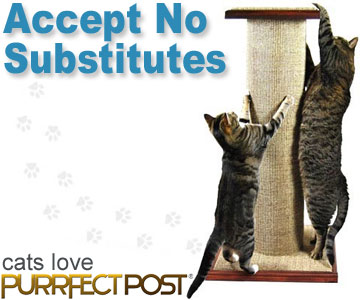Cat Weight Loss: How You Can Help Your Cat Lose Weight

In the wild, cats expend a lot of energy hunting for food. Now that they're domesticated, it's easy for housecats to become overweight. Getting your cat to shed unwanted pounds can be more difficult than getting yourself to the gym six days a week. It's hard to know where to start. Here are a few tips for helping your cat lose weight.
- Make sure your cat is on the correct food for her life stage. If she is a senior, she needs a diet formulated for older cats. Adult cats don't need kitten food anymore. Your veterinarian can give you specific age recommendations for your individual cat's circumstances.
-
Exercise your cat more. It's not always easy to exercise a cat. Some cats will walk around the block with you on a leash, but not many. The main way you can encourage your cat to get more exercise is to play with her more.
Make sure you have a large variety of toys. Wand toys, catnip toys, balls, fishing rods: the choices are endless. Cats like games that mimic hunting and pouncing so you need to be involved with the play sessions. Your job is to make the toys behave like prey.
Your cat can get bored and stop playing with toys so it's a good idea to keep two boxes filled with large assortments of tempting playthings. One box can stay in the closet while the other is in use. When your cat seems to be playing with the toys less, switch them out for the other boxful.
- Go easy on the treats. Cats love treats and we love to make our cats happy. But overdoing it on the treats may not only encourage weight gain but it could also cause illness if your cat doesn't eat enough of her regular food because she's always full from the treats. Canned food is a great idea for your cat's general diet but you may consider keeping a small bag of dry kibble around just to use as treats. It will have fewer calories and your cat will still love the interaction with you at treat-time.
- Your cat may need a special diet. Usually, simply feeding a little bit less of your cat's current diet and increasing her exercise will be enough to help her slowly lose weight. Sometimes, it may not be enough and that's when your veterinarian may recommend a specially-formulated weight loss diet. These diets usually contain higher fiber levels so your cat feels fuller.
Don't change your cat's diet suddenly because it can cause GI problems or your cat may stop eating. It is very important that overweight cats don't stop eating or lose weight too quickly because this can result in fatty liver disease, which can be life-threatening. Consult with your veterinarian before changing diets or drastically decreasing the amount of food you give her.
Using these tips can help your cat safely lose weight and live a longer, happier life.
You May Also Like These Articles:
Training Your Cat to Walk on a Leash
Wet Food vs. Dry Food for Cats
Obesity in Cats: Dangers and Solutions
Fatty Liver Disease in Cats (Hepatic Lipidosis)
Notice: Ask-a-Vet is an affiliated service for those who wish to speak with a veterinary professional about their pet's specific condition. Initially, a bot will ask questions to determine the general nature of your concern. Then, you will be transferred to a human. There is a charge for the service if you choose to connect to a veterinarian. Ask-a-Vet is not manned by the staff or owners of CatHealth.com, and the advice given should not delay or replace a visit to your veterinarian.




